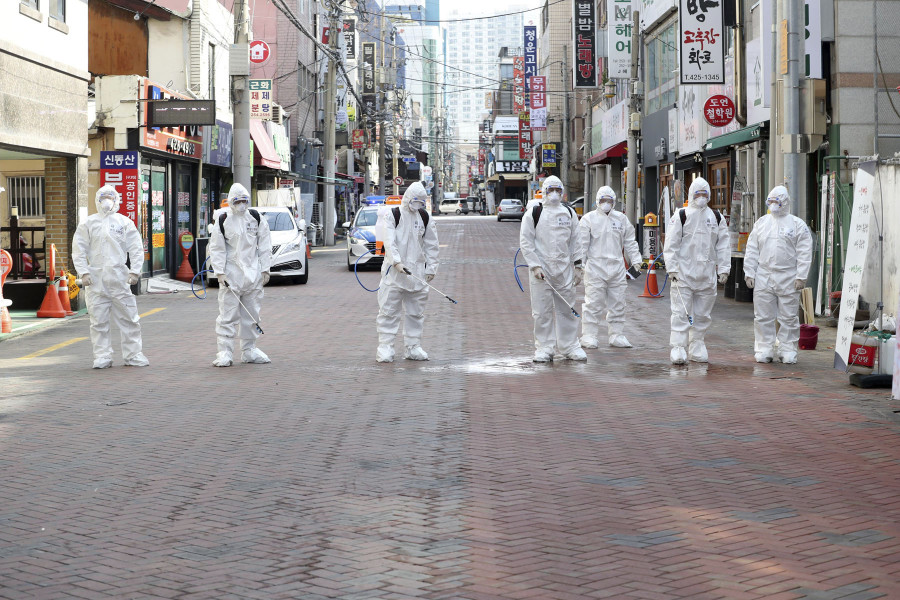Health
As Covid-19 spreads, public health officials consider plans for a worst-case scenario
Department of Health Services has a Plan B for a few infections but its Plan C envisions shutting down all schools, public transport and gatherings in case of a mass outbreak.
Arjun Poudel
While Covid-19 coronavirus infections have significantly slowed in China, they are rapidly spreading around the globe, prompting countries to step up measures to control the spread and the UN health agency to warn that “this is no time for complacency.”
With countries like the US sounding the alarm, Nepal, with its frail health system, cannot afford to rest, as public health experts say that it is not a question of 'if'’ the virus comes to Nepal but 'when'.
Amid the growing threat of a possible outbreak, the Department of Health Services on Thursday directed all concerned health agencies to cancel all scheduled meetings and focus on ways to deal with a worst-case scenario.
The department had held a high-level meeting on Wednesday, where it had discussed Plans B and C in case of an outbreak. Plan B envisions the response to the infection of just a few people.
“In such a scenario, we will have to entirely vacate particular hospitals,” Mahendra Prasad Shrestha, director-general of the department, told the Post.
Plan C deals with a worst-case scenario—a massive outbreak
“In our Plan C, we will have to shut down schools, colleges, public transport, and all public functions and gatherings,” said Shrestha.
Wednesday's meeting also decided to increase the number of health workers at the international health desk at Tribhuvan International Airport and strengthen health desks at eight land crossings.
According to Shrestha, the government is in close contact with all UN agencies, including the World Health Organization's country office in Nepal, and other international aid agencies, which have been supporting the country's health care system. Apart from flights from China, the department has also directed the airport health desk to screen air passengers coming from South Korea, Thailand, Singapore and Japan.
While Shrestha said that the department was serious about the threat of the outbreak, he admitted that they had yet to decide which hospital to vacate first, and what exact measures were being put in place to prevent a worst-case scenario.
After failing to procure a sufficient number of masks and protective gear due to global shortages, the department has now asked the World Health Organization for help. The UN health body will be providing a thousand masks on Thursday, said Shrestha.
Dr Bikash Devkota, a spokesperson for the Health Ministry, conceded that the country is at high risk of the outbreak and said that the ministry had asked various agencies to begin preparation accordingly.
“We have offered a budget and have assured help in easing rules and regulations to facilitate a timely decision,” said Devkota.
With temperatures rising, experts had hoped that the outbreak would decline but the increasing number of infections around the world have dashed those hopes. Infections have now been detected in Bahrain and Kuwait, where temperatures are over 38 degrees Celsius.
"The virus has reached America, Europe, Australia, Japan and South Korea,” said Dr Mingmar Gyelzen Sherpa, former director-general of the department. “We are at high risk as a lot of people are coming to Nepal from these countries every day. It is just a matter of time.”
First seen in Wuhan of China in late 2019, the virus has now spread to 47 countries, with the United States and Germany recording the first cases with no obvious source of infection.
Covid-19, the disease caused by the new strain of coronavirus, now dubbed SARS-CoV-2, has killed 2,814 and infected 82,585 people mostly in China.
A study published a few weeks ago by researchers at the University of Oxford, the University of Toronto and the London School of Medicine and Tropical Hygiene had identified Kathmandu as the 11th highest risk city and the third least-prepared country to handle an outbreak.
After recording the first case last month, no new cases have been reported in Nepal, but experts say continued vigilance is a must.
According to Dr Bibek Kumar Lal, former director of the Epidemiology and Disease Control Division, officials should be concerned about possible travel restrictions on Nepalis by other countries but also consider travel restrictions of its own. Nepal is completely dependent on India and China for goods, and both countries could restrict travel if an outbreak takes place
“India has already started screening Nepali passengers and made masks compulsory for all Nepalis,” said Lal. “But we haven’t even considered flight restrictions from any country facing an epidemic.”
The death rate from the Covid-19 coronavirus is around two percent in China but is considerably higher in countries with weaker health systems. Iran had, as of Thursday, reported 22 deaths out of 141 cases.
“Until now, people have not been informed about a possible worst-case scenario, health workers have not been trained, and government officials are unaware of treatment methods and required medicines,” said Sherpa. “It is time to start preparations.”




 20.12°C Kathmandu
20.12°C Kathmandu















